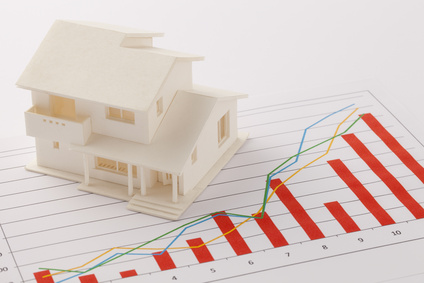Have you heard?
There’s been some bad weather lately….and it seems to have sub-marined much of the U.S. economy. At least that’s the official spin.
But is it all doom and gloom or is there a chance of sunshine?
Here to rise above the clouds of confusion to see what the latest economic stats mean to real estate investors…
- Your sunny host, Robert Helms
- His gloomy co-host, Russell Gray
You may have heard it said, “Figures lie and liars figure.” And we’ve learned that 87.2% of all stats are made up. Or is it 27.8%???
So when you hear about new housing starts, existing homes sales, mortgage applications and jobless claims, they’re all a bunch of stats that the tea leaf readers on TV and newspapers try to interpret.
The problem is those financial talking heads, as smart and attractive as they may be (at least when compared to the hosts of The Real Estate Guys™ Radio Show), aren’t real estate investors. So the paradigm, spin, interpretation and context they have is all for paper asset investors and real estate owner-occupants.
So what do all these economic metrics mean to real estate investors?
First, home sales get divided into two categories. The biggest chunk is EXISTING home sales and is reported by the National Association of Realtors. Existing home sales is an indicator of prosperity because new home buyers are entering the market and existing home owners are moving up. Presumably because they can afford to.
But take by themselves, existing home sales don’t tell the complete story. And for investing purposes, you have to dig down into geographic regions, price categories and buyer demographics. After all, who’s buying and who’s not, which area is hot and which is cooling, and whether prices are rising or falling, all begin to shine the light of opportunity or danger on specific places, price points and property types.
 For example, if you knew that the fastest growing segment of price point was in the $1 million and up price range and the fastest declining segment was in the <$100,000 price range, would that affect where you might choose to flip versus where you might choose to invest in rental property?
For example, if you knew that the fastest growing segment of price point was in the $1 million and up price range and the fastest declining segment was in the <$100,000 price range, would that affect where you might choose to flip versus where you might choose to invest in rental property?
The other component of housing sales is NEW home sales. But it’s a much smaller chunk. So why do so many talking heads care so much about housing starts?
Think about it. People who watch financial shows are often trading stocks. If housing starts are slow, it means home builder stocks are negatively impacted. Whereas if existing home sales slow, it only means some real estate agents don’t make as much commission. Sad for real estate agents, but meaningless to stock traders.
Another index that stock traders fixate on is home builder confidence. The idea is that if home builders are optimistic they’ll build and sell new homes. They means demand for labor and materials, plus all the goodies new homeowners spend money on when first moving in.
Sounds good. But if more people are buying homes, does it mean less people are renting? Which is better for landlords?
Again, the news is prepared for the audience it’s presenting to. And if you’re a real estate investor, financial TV is NOT talking to you.
Before we leave the topic of housing, think about this: Lots of people, including those who pull the levers of the macro-economy, think housing LEADS economic recovery.
Really?
Now, we’re just a couple of dudes on the radio, but it seems to us that housing REFLECTS economic recovery. See the difference?
If someone is overweight and they stand in front of the mirror, they can see the reflection of their condition. But the image in the mirror isn’t the person’s actual body. It’s only a reflection. So if someone didn’t like the condition there body was in and they modified the mirror to make their reflection thinner, does it make their actual body thinner? Of course not.
So, if people buy houses because they’re selling below replacement cost in the wake of a recession, and government subsidized interest rates and tax incentives make is easier to make a down payment and stretch the monthly payment into a bigger loan; or the down payment is coming from cashing in stocks whose value was inflated by easy monetary policy, does the activity reflect a healthy and robust economy? Or is it just a funny mirror that makes you appear to be in better shape than you really are?
We think housing is strong when people have good jobs and incomes, living costs are low, and they’re able to save up enough for a down payment and qualify for a loan. That is, the housing sale is a reflection of their success, NOT the cause of it.
If that’s true for an individual, wouldn’t it be true for a collection of individuals like a country?
We think so.
So do people have good jobs and incomes?
The jobless claims and labor participation rate says no. And with healthcare costs, food and energy costs rising, people are actually being pinched. Are these the conditions we’d expect in a healthy economy and a sustainable housing recovery?
Probably not.
Does this mean we’re bearish on real estate? Not at all. In fact, we still think this is a good time to acquiring income producing property in the right markets and price points. Though we do encourage caution in the aggressive use of leverage. We still see downward pressure on wages and discretionary income for the working class. So for long term buy and hold, cheaper markets with a good business climate and low costs of living are probably safest. Along with fixed rate loans and good operating margins.
If you’re a fix and flipper, the higher priced markets actually look better. At least according to the stats.
The point is, like any business, you must know your target market. If you want to sell the use of your property to a long term tenant, that’s a different game than flipping a pretty property to an owner-occupant. And the clues you need to make better decisions are in the news every day.
Listen Now:
- Don’t miss an episode of The Real Estate Guys™ radio show! Subscribe to the free podcast
- Stay connected with The Real Estate Guys™ on Facebook!
The Real Estate Guys™ radio show and podcast provides real estate investing news, education, training and resources that help real estate investors succeed. Visit our Feedback page and tell us what you think!













